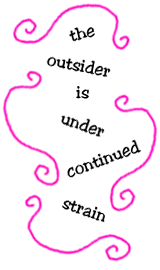
Q Dear Miss Abigail:
Oh, Miss Abigail, I need your help! How can I get my foreign man to see: “When in America do as the Americans?” His culture is coming between our courtship! Help!
Signed,
Plenty of Couscous and Confusi
A Dear Couscous:
Though you have not stated what the particular problems are, I am assuming that these two quotes regarding manners and the problems of international affairs, so to speak, will help you in your quest for happiness. I’m afraid, however, that your happiness might not include your foreign man. . .
1923: Good Society in America
![]() Everyone loves to mingle with cultured, well-bred people; with brilliant and celebrated individuals. Everyone loves to attend elaborate social functions where the gay gowns of beautiful women are only less charming and impressive than their faultless manners. But it is not everyone who can be admitted to these inner portals of good society.
Everyone loves to mingle with cultured, well-bred people; with brilliant and celebrated individuals. Everyone loves to attend elaborate social functions where the gay gowns of beautiful women are only less charming and impressive than their faultless manners. But it is not everyone who can be admitted to these inner portals of good society.
It is a well-known truth that manners rather than wealth decide social rank. A man may be fabulously wealthy, but if he does not know how to act, how to dress and speak, he will not be respected. American society has rules of its own, and those who are not willing to learn these laws are shunned, banished. Etiquette is the wall which divides the cultured from the uncultured, which keeps the ill-bred out of the circles where they would be awkward and uncomfortable, and where they would undoubtedly cause mortification to others.
On the other hand, to know these rules of good conduct is to be admitted to the highest circles of society. To know that one is correct banishes at once all uncertainty, all embarrassment. And one mingles with perfectly-mannered people, calm in the assurance that one knows just what is correct, and that no matter what happens one can do or say nothing to reflect on one’s breeding.![]()
Source: Eichler, Lillian. Book of Etiquette, Volume I. Garden City, New York: Nelson Doubleday, Inc.,1923.
~ pp. 13-14 ~
1948: Cultural, Religious, and Racial Differences
![]() A person seriously in love with someone from an environment highly different from his own is in an especially trying predicament. Either separation or marriage may be tremendously difficult. Desirable as it is to become acquainted with a variety of people and customs, it may, nevertheless, be wise to limit one’s social life chiefly to people with backgrounds similar to one’s own. There is something to be said for attending social functions mainly patronized by people among whom, as eventual in-laws and neighbors, one would feel at home. To do otherwise may invite trouble. . . .
A person seriously in love with someone from an environment highly different from his own is in an especially trying predicament. Either separation or marriage may be tremendously difficult. Desirable as it is to become acquainted with a variety of people and customs, it may, nevertheless, be wise to limit one’s social life chiefly to people with backgrounds similar to one’s own. There is something to be said for attending social functions mainly patronized by people among whom, as eventual in-laws and neighbors, one would feel at home. To do otherwise may invite trouble. . . .
Where the marriage partners come from different religious, economic, political, or social backgrounds, there are endless possible sources of irritation. The members of any one group little realize the degree to which they take certain ideas and values for granted, and the extent to which they may ridicule in their jokes, stories, and various actions, the ideas cherished by other groups. The outsider is under continued strain, even though he may succeed in avoiding overt conflicts with his in-laws and their friends. At times his resentments may burst forth, and their will be scenes difficult to forget.
If the marriage partners are unusually tolerant and good-natured, and have a great deal in common, they may overcome these difficulties. There have been numerous happy interracial, international, and interreligious marriages. The very fact that their particular marriage is fraught with special difficulties sometimes puts people on their mettle. It challenges them to overcome the obstacles together. In the long run, however, differences in outlook and values are likely to prove more irritating than challenging. ![]()
Source: Leuba, Clarence. Ethics in Sex Conduct: A Manual on Youth, Sex, and Marriage. New York: Association Press, 1948.
~ pp. 127-29 ~